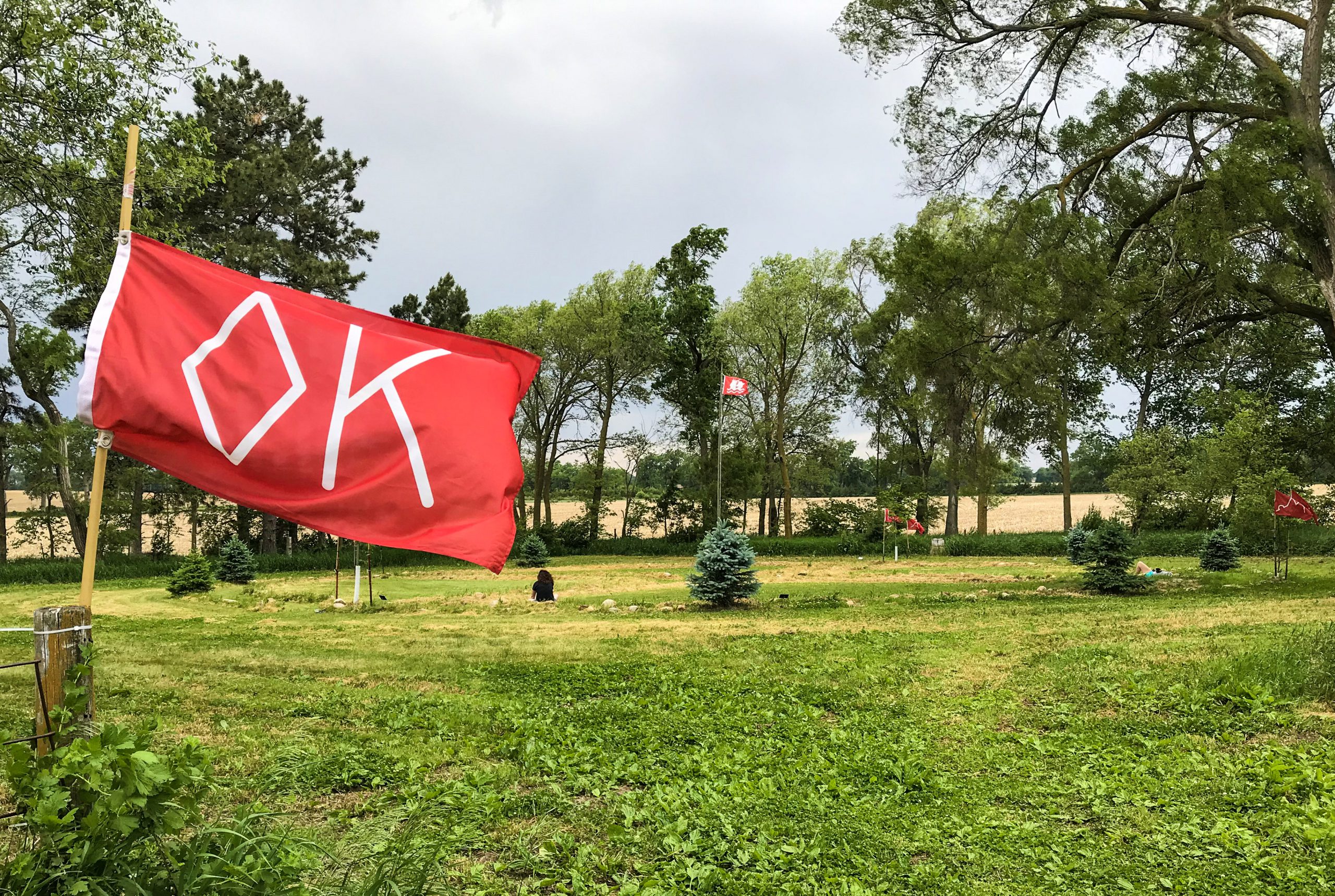 Art and Helen Tanderup constructed a medicine wheel-shaped circle on their farm near Neligh, Nebraska, to honor various opponents of the Keystone XL Pipeline, including the late Frank LaMere, Chief Arvol Looking Horse and the Ponca tribes of Oklahoma and Nebraska. Photo by Kevin Abourezk
Art and Helen Tanderup constructed a medicine wheel-shaped circle on their farm near Neligh, Nebraska, to honor various opponents of the Keystone XL Pipeline, including the late Frank LaMere, Chief Arvol Looking Horse and the Ponca tribes of Oklahoma and Nebraska. Photo by Kevin Abourezk The announcement was hailed in neighboring South Dakota as well. The Rosebud Sioux Tribe sued the federal government after the Donald Trump administration approved the pipeline over Indian Country’s objections. “This is great news for the tribes who have been fighting to protect our people and our lands,” President Rodney Bordeaux said. “The treaties and laws guarantee us protections, and we are committed to see that those laws are upheld.” And in Montana, President Andy Werk of the Fort Belknap Indian Community was “thrilled” with the development. His tribe also has been part of the litigation with Rosebud Sioux. “The TransCanada announcement is a relief to those of us who stood in the pipeline’s path,” said Werk. “We were not willing to sacrifice our water or safety for the financial benefit of a trans-national corporation. We are thrilled that the project has been canceled.”BREAKING: Nebraska Landowners, Tribal Nations, Rejoice as @TCEnergy Says #KeystoneXL Pipeline is Terminated: https://t.co/uIUeVKJHhm#NoKXL #NoKXLPledge #WaterIsLife #HonorTheTreaties #ActOnClimate #neleg @janekleeb pic.twitter.com/zxLGBngeYm
— Bold Nebraska (@BoldNebraska) June 9, 2021
Tribes have been joined on the frontlines by Native activists who have been fighting Keystone XL through three presidential administrations. The Indigenous Environmental Network could hardly contain its glee after learning about the cancellation of the project, which would have carried up to 830,000 barrels of crude oil per day from the tar sands of Canada to oil refineries in the Gulf Coast of the United States. “After more than 10 years of organizing we have finally defeated an oil giant, Keystone XL is dead!” the organization said in a statement. “We are dancing in our hearts because of this victory!” “From Dene territories in Northern Alberta to Indigenous lands along the Gulf of Mexico, we stood hand-in-hand to protect the next seven generations of life, the water and our communities from this dirty tar sands pipeline,” the statement continued. “And that struggle is vindicated.”BREAKING: On Wednesday, TransCanada (TC Energy) announced that it will terminate its Keystone XL Pipeline, removing the imminent threat to the tribes, people, and sacred place that stood in the pipeline's proposed path. #KXL #HonorTheTreaties
— Native American Rights Fund (@NDNrights) June 9, 2021
READ MORE: https://t.co/g8BfAwtiiM pic.twitter.com/voBmfGlRaz
TC Energy said on Wednesday that it had made the decision after conferring with the provincial government of Alberta in Canada. The company lamented U.S. President Joe Biden’s decision to cancel its permit on his first day in office on January 20. The company said it will coordinate with regulators, stakeholders and Indigenous groups to meet its environmental and regulatory commitments and ensure a safe termination and exit from the project. “We remain grateful to the many organizations that supported the Project and would have shared in its benefits, including our partners, the Government of Alberta and Natural Law Energy, our customers, pipeline building trade unions, local communities, Indigenous groups, elected officials, landowners, the Government of Canada, contractors and suppliers, industry associations and our employees,” said TC Energy President and CEO François Poirier. Jane Kleeb, founder of Bold Nebraska, which fought the pipeline in Nebraska, urged the Nebraska Public Service Commission to prepare an order revoking the state permit it granted to TC Energy. Until that happens, she said, farmers and ranchers will continue to face the company’s attorneys in court in order to protect their property from eminent domain proceedings. Kleeb also praised the efforts of pipeline fighters. “Pipeline fighters never gave up, even after President Biden stood with us and we knew locally the fight was not over until TransCanada waved the white flag,” Kleeb said. One of those pipeline fighters is Art Tanderup, a farmer near Neligh, Nebraska, whose land would have been impacted by the pipeline’s development. He also expressed relief at the company’s announcement. “This action provides proof that the stewards of the earth and the water; the farmers, ranchers, and tribes know how to respect what the Creator has given us,” he said. In 2018, Tanderup and his wife Helen returned land to the Ponca tribes of Nebraska and Oklahoma.The fight against #KXL is not completely over. There are water protectors who still face charges for standing against the dirty tar sands pipeline.
— Indigenous Environmental Network (@IENearth) June 9, 2021
Donate what you can to Oscar High Elk's legal fund. https://t.co/AQ9PTozwLK pic.twitter.com/NlNBCTaz7M
 Art and Helen Tanderup planted a tree and installed this plaque in honor of the late Frank LaMere, a citizen of the Winnebago Tribe who fought against the Keystone XL Pipeline before his passing in 2019. Photo by Kevin Abourezk
Art and Helen Tanderup planted a tree and installed this plaque in honor of the late Frank LaMere, a citizen of the Winnebago Tribe who fought against the Keystone XL Pipeline before his passing in 2019. Photo by Kevin Abourezk Native America Calling: How Native literature is changing the mainstream narrative
Native America Calling: No ordinary animal
Native America Calling: Safeguards on Artificial Intelligence
NAFOA: 5 Things You Need to Know this Week
Chuck Hoskin: Cherokee Nation takes the lead for our environment
Native America Calling: Earth Day assessment for Native peoples
Cronkite News: Gathering addresses ‘epidemic’ among Native people
VIDEO: Cody Desautel on tribes and federal forest management
AUDIO: Legislative Hearing on Discussion Draft of Forest Management Bill
Native America Calling: Remembering the 1974 Navajo border town murders
Native America Calling: Can the right approach close the Native immunization gap?
Cronkite News: Long COVID cases remain high in Arizona
Native America Calling: Eyes in the sky for development, public safety, and recreation
Native America Calling: Three new films offer diverse views of Native life
More Headlines